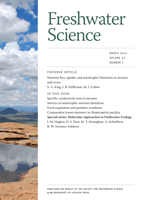The factors influencing the habitat requirements and dispersal of juvenile Unionidae (unionids) between post-larval detachment from a fish host and burrowing into the substratum are largely unknown, although bed shear stress (τw) has been proposed as a critical factor. We used a laboratory wall jet apparatus to manipulate τw experimentally to examine the suspension and burrowing of juvenile Epioblasma triquetra, Villosa iris, Lampsilis fasciola, and Ligumia nasuta. τw and unionid suspension were significantly related when τw > 0.26 Pa, but this relationship also was influenced by mussel behavior. Greater τw was required for suspension when a mussel's foot adhered to a surface. Laboratory experiments confirmed predictions that juvenile unionids cannot become established when τw exceeds a critical value. Hydrodynamics and behavior strongly affect dispersal by juvenile mussels and may influence juvenile mussel habitat requirements, and thereby have implications for conservation efforts.
How to translate text using browser tools
22 January 2014
Responses of Newly Settled Juvenile Mussels to Bed Shear Stress: Implications for Dispersal
Sarah K. French,
Josef D. Ackerman
ACCESS THE FULL ARTICLE
It is not available for individual sale.
This article is only available to subscribers.
It is not available for individual sale.
It is not available for individual sale.

Freshwater Science
Vol. 33 • No. 1
March 2014
Vol. 33 • No. 1
March 2014
adhesion
conservation
early life history
hydrodynamics
post-settlement dispersal
unionid mussel




